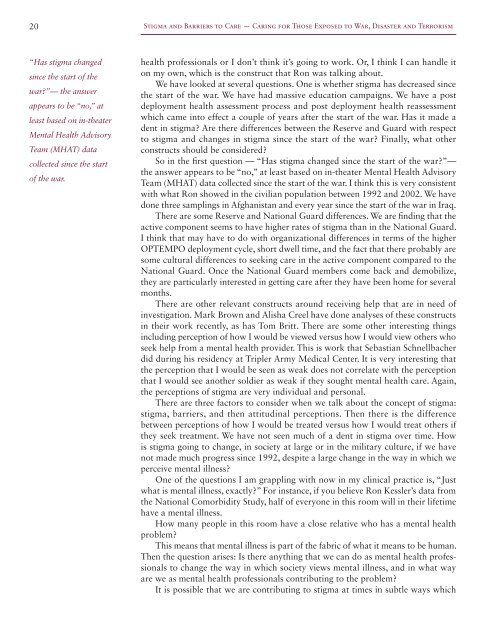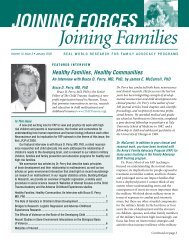stigma and barriers to care - Uniformed Services University of the ...
stigma and barriers to care - Uniformed Services University of the ...
stigma and barriers to care - Uniformed Services University of the ...
You also want an ePaper? Increase the reach of your titles
YUMPU automatically turns print PDFs into web optimized ePapers that Google loves.
20<br />
Stigma <strong>and</strong> Barriers <strong>to</strong> Care — Caring for Those Exposed <strong>to</strong> War, Disaster <strong>and</strong> Terrorism<br />
“Has <strong>stigma</strong> changed<br />
since <strong>the</strong> start <strong>of</strong> <strong>the</strong><br />
war”— <strong>the</strong> answer<br />
appears <strong>to</strong> be “no,” at<br />
least based on in-<strong>the</strong>ater<br />
Mental Health Advisory<br />
Team (MHAT) data<br />
collected since <strong>the</strong> start<br />
<strong>of</strong> <strong>the</strong> war.<br />
health pr<strong>of</strong>essionals or I don’t think it’s going <strong>to</strong> work. Or, I think I can h<strong>and</strong>le it<br />
on my own, which is <strong>the</strong> construct that Ron was talking about.<br />
We have looked at several questions. One is whe<strong>the</strong>r <strong>stigma</strong> has decreased since<br />
<strong>the</strong> start <strong>of</strong> <strong>the</strong> war. We have had massive education campaigns. We have a post<br />
deployment health assessment process <strong>and</strong> post deployment health reassessment<br />
which came in<strong>to</strong> effect a couple <strong>of</strong> years after <strong>the</strong> start <strong>of</strong> <strong>the</strong> war. Has it made a<br />
dent in <strong>stigma</strong> Are <strong>the</strong>re differences between <strong>the</strong> Reserve <strong>and</strong> Guard with respect<br />
<strong>to</strong> <strong>stigma</strong> <strong>and</strong> changes in <strong>stigma</strong> since <strong>the</strong> start <strong>of</strong> <strong>the</strong> war Finally, what o<strong>the</strong>r<br />
constructs should be considered<br />
So in <strong>the</strong> first question — “Has <strong>stigma</strong> changed since <strong>the</strong> start <strong>of</strong> <strong>the</strong> war”—<br />
<strong>the</strong> answer appears <strong>to</strong> be “no,” at least based on in-<strong>the</strong>ater Mental Health Advisory<br />
Team (MHAT) data collected since <strong>the</strong> start <strong>of</strong> <strong>the</strong> war. I think this is very consistent<br />
with what Ron showed in <strong>the</strong> civilian population between 1992 <strong>and</strong> 2002. We have<br />
done three samplings in Afghanistan <strong>and</strong> every year since <strong>the</strong> start <strong>of</strong> <strong>the</strong> war in Iraq.<br />
There are some Reserve <strong>and</strong> National Guard differences. We are finding that <strong>the</strong><br />
active component seems <strong>to</strong> have higher rates <strong>of</strong> <strong>stigma</strong> than in <strong>the</strong> National Guard.<br />
I think that may have <strong>to</strong> do with organizational differences in terms <strong>of</strong> <strong>the</strong> higher<br />
OPTEMPO deployment cycle, short dwell time, <strong>and</strong> <strong>the</strong> fact that <strong>the</strong>re probably are<br />
some cultural differences <strong>to</strong> seeking <strong>care</strong> in <strong>the</strong> active component compared <strong>to</strong> <strong>the</strong><br />
National Guard. Once <strong>the</strong> National Guard members come back <strong>and</strong> demobilize,<br />
<strong>the</strong>y are particularly interested in getting <strong>care</strong> after <strong>the</strong>y have been home for several<br />
months.<br />
There are o<strong>the</strong>r relevant constructs around receiving help that are in need <strong>of</strong><br />
investigation. Mark Brown <strong>and</strong> Alisha Creel have done analyses <strong>of</strong> <strong>the</strong>se constructs<br />
in <strong>the</strong>ir work recently, as has Tom Britt. There are some o<strong>the</strong>r interesting things<br />
including perception <strong>of</strong> how I would be viewed versus how I would view o<strong>the</strong>rs who<br />
seek help from a mental health provider. This is work that Sebastian Schnellbacher<br />
did during his residency at Tripler Army Medical Center. It is very interesting that<br />
<strong>the</strong> perception that I would be seen as weak does not correlate with <strong>the</strong> perception<br />
that I would see ano<strong>the</strong>r soldier as weak if <strong>the</strong>y sought mental health <strong>care</strong>. Again,<br />
<strong>the</strong> perceptions <strong>of</strong> <strong>stigma</strong> are very individual <strong>and</strong> personal.<br />
There are three fac<strong>to</strong>rs <strong>to</strong> consider when we talk about <strong>the</strong> concept <strong>of</strong> <strong>stigma</strong>:<br />
<strong>stigma</strong>, <strong>barriers</strong>, <strong>and</strong> <strong>the</strong>n attitudinal perceptions. Then <strong>the</strong>re is <strong>the</strong> difference<br />
between perceptions <strong>of</strong> how I would be treated versus how I would treat o<strong>the</strong>rs if<br />
<strong>the</strong>y seek treatment. We have not seen much <strong>of</strong> a dent in <strong>stigma</strong> over time. How<br />
is <strong>stigma</strong> going <strong>to</strong> change, in society at large or in <strong>the</strong> military culture, if we have<br />
not made much progress since 1992, despite a large change in <strong>the</strong> way in which we<br />
perceive mental illness<br />
One <strong>of</strong> <strong>the</strong> questions I am grappling with now in my clinical practice is, “Just<br />
what is mental illness, exactly” For instance, if you believe Ron Kessler’s data from<br />
<strong>the</strong> National Comorbidity Study, half <strong>of</strong> everyone in this room will in <strong>the</strong>ir lifetime<br />
have a mental illness.<br />
How many people in this room have a close relative who has a mental health<br />
problem<br />
This means that mental illness is part <strong>of</strong> <strong>the</strong> fabric <strong>of</strong> what it means <strong>to</strong> be human.<br />
Then <strong>the</strong> question arises: Is <strong>the</strong>re anything that we can do as mental health pr<strong>of</strong>essionals<br />
<strong>to</strong> change <strong>the</strong> way in which society views mental illness, <strong>and</strong> in what way<br />
are we as mental health pr<strong>of</strong>essionals contributing <strong>to</strong> <strong>the</strong> problem<br />
It is possible that we are contributing <strong>to</strong> <strong>stigma</strong> at times in subtle ways which




